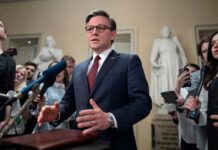As science became more politicized, O’Brien and Noy said, it was no longer seen as neutral, but as progressive. The politicization of religion also changed faith’s cultural association with piety to a link to conservatism. Both science and religions were recast as alternative, even opposing, sources of knowledge, values and authority.
“Religion has taken on a meaning such that even nonreligious people affiliate with it, because that meaning has become politicized,” O’Brien said.
Noy suggested that the GSS data debunks the popular notion that people who espouse “traditional family” values are also confident in religion, mistrusting of science and identify as Republican. The GOP hasn’t always viewed the scientific community with suspicion, she said, pointing to how Republican presidents formed science advisory committees in the past to help promote national interests.
“We, of course, live in our moment and think, of course, Republicans are going to be skeptical of the vaccine. But in fact we have no reason to believe that needs to be the case,” Noy said. “If we look at the data over time and in other countries, there’s no natural fit there; it’s just how things have progressed for a variety of reasons — political alliances, cultural context and international context.”
Business interests had a profound impact on the politicization of religion and science, the researchers said. As social movements highlighting the concerns of workers, consumers and the environment emerged in the 1970s, government regulatory agencies grew increasingly dependent on scientists as advisers. Large corporations reacted by calling for deregulation, often pushing aside the science.
At the same time, conservative ideology was being influenced by a widespread anti-intellectual movement that normalized contempt for scientists and others seen as cultural elites. All of these elements coalesced in the Republican Party, redefining in part what it meant to be conservative.
Over the same period, scientists themselves became more politically active and organized, often siding with liberal defense, environmental and economic policies. This enhanced the public’s image of science as a liberal institution.











